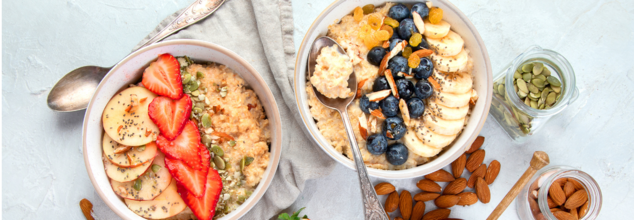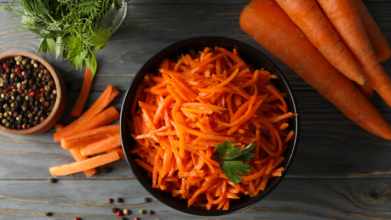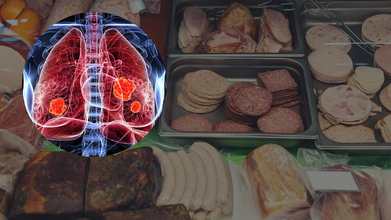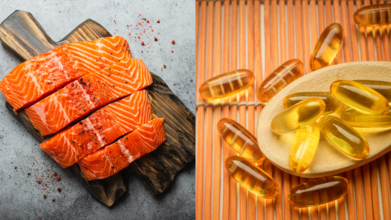- Health Conditions A-Z
- Health & Wellness
- Nutrition
- Fitness
- Health News
- Ayurveda
- Videos
- Medicine A-Z
- Parenting
- Web Stories
Oats Without Milk: Healthy And Nutritional Daily Breakfast Recipes You Must Try

Oatmeal Breakfast Bowl
Starting your day with a bowl of nourishing oats that don't just fill you up but also fuel you with lasting energy. The versatility of oats allows them to fit into any morning routine, offering a wealth of nutrition and flavor without the need for milk. Whether you're lactose intolerant, vegan, or just looking to shake up your breakfast routine, oats can be transformed into a range of delicious, healthy meals. From sweet to savory, the options are endless, providing a perfect balance between flavor and nutrition.
With their high fiber, protein, and complex carbohydrate content, oats make for a meal that’s not only satisfying but also beneficial to your overall health. So, whether you crave a cozy bowl of oatmeal or a quick grab-and-go snack, there’s an oat-based recipe to match your lifestyle.
Oats are a nutrient-dense whole grain that provides a wealth of health benefits. They are an excellent source of fiber, particularly beta-glucan, which has been linked to heart health and improved cholesterol levels. Below is a breakdown of the key nutritional components of oats (based on 100 grams of raw oats):
Nutritional Composition (per 100 grams of raw oats)
Calories: 389 kcal
Protein: 16.9 grams
Carbohydrates: 66.3 grams
Fiber: 10.6 grams (Soluble and Insoluble)
Sugars: 0 grams
Fats: 6.9 grams
Saturated fat: 1.2 grams
Monounsaturated fat: 2.2 grams
Polyunsaturated fat: 2.5 grams
Water: 8.2 grams
Key Vitamins and Minerals
- Vitamin B1 (Thiamine): 0.76 mg (51% of the daily recommended intake)
- Vitamin B5 (Pantothenic acid): 1.35 mg (27% of daily recommended intake)
- Iron: 4.72 mg (26% of daily recommended intake)
- Magnesium: 177 mg (44% of daily recommended intake)
- Phosphorus: 523 mg (52% of daily recommended intake)
- Zinc: 3.97 mg (26% of daily recommended intake)
- Manganese: 4.9 mg (246% of daily recommended intake)
- Copper: 0.63 mg (32% of daily recommended intake)
9 Nutritional Oats Recipe You Must Try
Let’s dive into some creative, easy-to-make, and mouthwatering oat recipes that will not only add variety to your breakfast but also help you kickstart your day on a nutritious note.
Overnight Oats
One of the easiest and most convenient breakfast options, overnight oats can be prepared the night before, allowing you to enjoy a chilled and creamy meal in the morning. Combine oats with your favorite plant-based milk alternative (such as almond or oat milk) and let them soak overnight. In the morning, top with fresh fruits, nuts, or seeds for added flavor and nutrition. It’s a customizable dish that can be as simple or extravagant as you desire.
Savoury Oatmeal
For those who prefer savory flavors, savory oatmeal is a game-changer. Swap the usual water for vegetable broth to cook your oats, and then add hearty vegetables like spinach, mushrooms, and bell peppers. Finish off with a poached egg or a sprinkle of cheese for an extra protein boost. This twist on traditional oatmeal is perfect for those mornings when you crave something warm, filling, and packed with flavor.
Oatmeal Pancakes
Who says you can’t have pancakes on a healthy diet? Oatmeal pancakes are a wholesome alternative to traditional pancakes, using oats as the base ingredient. Mix oats with a plant-based milk alternative, baking powder, and a touch of sweetness to create a batter. Cook them on a griddle until golden brown and serve with your favorite toppings like fruits, nuts, or a drizzle of maple syrup. These pancakes provide a satisfying way to indulge without guilt.
Oatmeal Cookies
Breakfast doesn’t have to be boring, and oatmeal cookies are proof of that. Made with oats, a plant-based milk alternative, and natural sweeteners like honey or maple syrup, these cookies are soft, chewy, and perfect for a morning treat. Add in some raisins or chocolate chips for extra indulgence, and pair with a cup of coffee or tea for a delightful breakfast experience.
Oatmeal Smoothie
If you’re short on time but still want a nutrient-dense meal, an oatmeal smoothie is the way to go. Blend oats with your favorite fruits, plant-based milk alternative, and optional add-ins like spinach or protein powder for a breakfast that’s both quick and energizing. This smoothie will leave you feeling full and ready to take on the day.
Oatmeal Energy Balls
For a grab-and-go option, oatmeal energy balls are a fantastic choice. Combine oats, nut butter, and a sweetener of your choice, then roll into bite-sized balls. These energy-packed snacks can be stored in the fridge, making them a convenient breakfast or mid-morning snack that will keep you satisfied until your next meal.
Oatmeal Chia Pudding
If you enjoy a thicker, pudding-like texture, oatmeal chia pudding is the perfect solution. Combine oats, chia seeds, a plant-based milk alternative, and a sweetener in a jar, and let the mixture sit overnight. In the morning, you’ll have a creamy, nutrient-dense pudding that’s as delicious as it is healthy.
Oatmeal Breakfast Bowl
A simple yet versatile option, the oatmeal breakfast bowl allows you to get creative with toppings. Start with a base of cooked oats and then add an assortment of fruits, nuts, seeds, or yogurt. Drizzle with honey or maple syrup for sweetness, and you’ve got a breakfast that’s not only nutritious but also tailored to your personal tastes.
Oatmeal Granola
For a crunchier breakfast, try oatmeal granola. Mix oats with nuts, seeds, and a sweetener like honey, then bake until golden brown. This granola can be enjoyed with yogurt, fresh fruit, or a plant-based milk alternative. It’s a satisfying and crunchy option for those who like to start their day with a heartier meal.
Health Benefits
1. Heart Health: Oats are high in beta-glucan, a soluble fiber that helps lower LDL cholesterol levels, reducing the risk of heart disease.
2. Blood Sugar Control: The complex carbohydrates in oats break down slowly, which helps in maintaining steady blood sugar levels, making oats ideal for people with diabetes or those looking to prevent blood sugar spikes.
3. Digestive Health: The high fiber content aids in digestion and helps prevent constipation.
4. Weight Management: Oats can promote satiety, helping with appetite control and weight management.
5. Rich in Antioxidants: Oats contain avenanthramides, a unique group of antioxidants that have anti-inflammatory properties and may help lower blood pressure.
Oats are much more than a simple breakfast ingredient—they’re a versatile canvas for creating meals that are as nutritious as they are delicious. Whether you prefer them in a smoothie, pancake, or even as a savory dish, oats offer endless possibilities for starting your day on a healthy note. These recipes allow you to explore the full potential of this humble grain, offering a range of flavors and textures that will keep your mornings exciting and wholesome.
'Eat Your Skin Care' What This Online Trend Really Mean

Credits: Canva
It started with a simple TikTok video, four large carrots shaved into ribbons, mixed with garlic, sesame oil, lime juice, coconut aminos, rice vinegar, and green onions. The resulting “crunchy and addictive” salad quickly racked up millions of views under the viral trend #EatYourRetinol. But is it just social media hype, or can what’s on your plate really show up on your face?
The trend encourages eating vitamin A-rich foods, like carrots, to support skin health from the inside out. “Skincare always starts within,” says Johanna Salazar, registered dietitian nutritionist and founder of Healing Nutrition, as noted by Martha Stewart. But experts urge a balanced view: while diet can support your skin, it’s not a magic replacement for topical care.
What’s in the Carrot Salad That’s Good for Your Skin?
The base of the salad, carrots, are packed with beta-carotene, a precursor to vitamin A, known for boosting skin cell turnover and promoting a radiant complexion. Pairing it with a fat, like sesame oil, helps your body absorb the fat-soluble vitamin. Lime juice adds vitamin C, key for collagen production, while garlic and green onion offer prebiotics that support gut health, which in turn impacts skin health.
Sesame seeds sprinkled on top bring in vitamin E and fiber, which contribute to skin hydration and a healthy glow.
“It’s a nice mix of ingredients that all play small but beneficial roles in skin support,” says Salazar.
Dermatologists Weigh In: Not a Cure-All
Lauren Kole, M.D., associate professor of dermatology at the University of Alabama at Birmingham, appreciates the effort to eat for skin health—but with a word of caution.
“Deficiencies in certain vitamins and minerals can negatively affect the hair, skin, and nails,” she says. “But eating an excess doesn’t necessarily make your skin better.”
Kole points out that while beta-carotene from carrots is helpful, it's not strong enough to replace prescription retinol or other topical treatments for conditions like acne or hyperpigmentation. “Diet is not a substitute for proper skin care,” she emphasizes.
Beyond Carrots: Other Skin-Loving Foods
Experts agree that eating for your skin isn’t just about one salad. A variety of fruits, vegetables, and healthy fats are essential. Salazar and Kole both recommend incorporating:
Dark-colored fruits like berries and red grapes, which are high in antioxidants that fight oxidative skin damage.
Leafy greens such as spinach, kale, and chard, which are rich in vitamin C and help with collagen production.
Vegetables like broccoli, mushrooms, and cauliflower, which support healthy pigmentation and skin repair.
Healthy fats including avocados, walnuts, flaxseeds, and omega-3-rich foods to reduce inflammation and maintain skin moisture.
According to Kole, diets like the Mediterranean diet—rich in plant-based foods and good fats, have shown potential skin benefits in clinical settings.
Don’t Ditch Your Skincare Just Yet
While the “Eat Your Retinol” movement has its heart in the right place, Salazar and Kole stress that no food trend should replace professional skincare or personalized advice.
Lizzy Davis, Ph.D., a dietitian and assistant professor at UAB, advises people to approach such trends with balance.
“Cooking carrots, for example, doesn’t reduce their skin-friendly fiber,” she notes. “It can actually make them easier to digest and still beneficial.”
Davis also warns against over-relying on TikTok or Instagram for skincare advice. “Talk to your doctor or a registered dietitian,” she says. “Social media is convenient, but it can’t give you a plan tailored to your needs.”
Not Just Cigarettes, But Your Food Too Could Increase Your Chance Of Lung Cancer

Credits: Canva
We already know that ultraprocessed foods are linked to obesity, heart disease, and diabetes. But now, a new study published in the medical journal Thorax suggests a concerning addition to that list, lung cancer.
According to researchers, people who consume the highest amounts of ultraprocessed foods may face a 41% higher risk of being diagnosed with lung cancer, compared to those who eat the least, even when accounting for smoking and other known risk factors.
What Are Ultraprocessed Foods?
Ultraprocessed foods are industrial formulations made largely or entirely from substances not typically used in home cooking.
According to the Food and Agriculture Organization of the United Nations, these include artificial colorings, preservatives, emulsifiers, and chemically altered fats, sugars, or salts.
Common examples? Think sodas, chips, packaged soups, processed meats like chicken nuggets and cold cuts, instant noodles, diet soft drinks, and even some ice creams.
These additives enhance taste, shelf-life, and appearance, but at what cost?
What Does The Study Reveal About Food Choices and Lung Cancer Risk
Researchers behind the Thorax study analyzed data from over 100,000 adults who participated in the U.S. National Health and Nutrition Examination Survey. Each person filled out a detailed dietary questionnaire, which researchers then compared with medical records to track lung cancer diagnoses over time.
On average, people reported eating nearly three servings of ultraprocessed food a day, most commonly lunch meats and soft drinks.
Despite adjusting for smoking habits, age, sex, and other lifestyle factors, the study found a clear association between higher ultraprocessed food intake and increased lung cancer risk, particularly among people who had never smoked.
“This strongly suggests that these foods may contribute to lung cancer risk in ways beyond just smoking,” said Dr. David Katz, a specialist in preventive and lifestyle medicine and founder of the nonprofit True Health Initiative, as reported by CNN. Though not involved in the study, Katz called the findings “concerning and credible.”
Why Would Food Be Linked to Lung Cancer?
Experts believe multiple mechanisms could be behind the link.
“Industrial processing alters the food matrix,” the study authors explained, “which affects how nutrients are absorbed and may produce harmful contaminants.”
One such contaminant is acrolein. It is a toxic compound found not only in cigarette smoke, but also produced when cooking oils or fats are heated to high temperatures.
The U.S. Centers for Disease Control and Prevention (CDC) lists acrolein as a substance that can inflame and damage lung tissue.
Packaging may also be a problem. Plastics and synthetic materials used in food storage can leach chemicals, some of which are known or suspected carcinogens.
Add to that the fact that ultraprocessed foods are often low in omega-3 fatty acids, said Dr. Tom Brenna, professor of nutrition and chemistry at the University of Texas at Austin, as reported by CNN.
“Omega-3s spoil easily, so manufacturers tend to remove them to increase shelf life,” he explained. That’s unfortunate, because omega-3s help reduce inflammation, a key process in cancer development.
Smoking Isn’t the Only Risk Factor
Lung cancer remains one of the most commonly diagnosed cancers globally, with 2.4 million new cases in 2022, according to the World Health Organization. While smoking remains the leading risk factor, experts now believe diet and environmental exposures also play a role.
Dr. Fang Fang Zhang, a professor at Tufts University’s Friedman School of Nutrition Science and Policy, as reported by CNN, noted that while the study adjusted for smoking, the adjustment may not have been thorough enough. “Smoking needs to be measured more precisely, by cigarettes per day or years of exposure,” she said. Still, she found the link stronger in non-smokers, which makes the data all the more compelling.
What You Can Do: Eat More Whole Foods
The takeaway? While more research is needed to understand the exact biological mechanisms at play, the connection between ultraprocessed foods and cancer risk can no longer be ignored.
According to Dr. Katz, the solution lies in going back to basics. “Health and diet quality improve when people eat mostly whole, unprocessed foods,” he said, including vegetables, fruits, beans, whole grains, nuts, seeds, and other plant-based ingredients.
Dr. Zhang agrees. “Avoid foods with long ingredient lists full of unfamiliar chemicals,” she advised. “Focus on meals made from whole or minimally processed ingredients whenever possible.”
From PMS to Postpartum, Heart to Hormones: Why Fish Oil is the Ultimate Health Elixir for Every Woman at Every Stage

Fish oil is a star supplement loaded with omega-3 fatty acids like EPA and DHA. It offers a spectrum of vital benefits for women’s health. These extend beyond general well-being to support heart, brain and joint function, especially in areas of concern specific to women.
Fish oil, rich in omega-3s, addresses unique needs across all stages of a woman’s life. From adolescence through motherhood to menopause, fish oil supports cardiovascular, hormonal, mental and reproductive health.
A Boost for the Heart
Fish oil plays a major role in promoting heart health. According to Dr Mohit Bhatia, it helps lower triglyceride levels, a risk factor for cardiovascular disease, and improves blood flow, making it essential for proper cardiovascular function. He adds that it also slows the progression of cardiovascular disease.
Karan Khurana, a health expert at WishNew Wellness, concurs, saying that omega-3s in fish oil reduce triglycerides, lower blood pressure, and decrease arterial inflammation. This is particularly vital for post-menopausal women, who face a greater risk of heart disease. Regular consumption of fish oil, he says, can even lower the risk of heart attacks and strokes.
Hormones, Menstrual Cycles and PMS
Women facing bloating, mood swings or cramps may find some relief with fish oil. Dr Bhatia says that some evidence-based research suggests fish oil can help alleviate PMS and menstrual pain, thanks to its anti-inflammatory properties.
Khurana elaborates that omega-3s may regulate menstrual cycles and reduce cramps by lowering prostaglandin levels, which contribute to pain and inflammation. He adds that fish oil can ease common PMS symptoms such as bloating and breast tenderness.
Pregnancy, Postpartum and a Baby’s Brain
The benefits of fish oil carry into pregnancy too. Dr Bhatia points out the importance of DHA during this stage, saying it is vital for healthy foetal brain and eye development. It may also reduce the risk of preterm birth and help alleviate postpartum depression.
Khurana backs this up, pointing out that fish oil supplementation not only supports cognitive function in babies but also helps mothers manage postpartum depression. It plays a role in maintaining the mother’s brain health during and after pregnancy.
Bones, Joints and the Menopause Years
Post-menopause, bone health becomes a serious concern for many women. Dr Bhatia says that the anti-inflammatory properties of fish oil can contribute to bone health, potentially reducing the risk of osteoporosis.
Khurana adds that omega-3s enhance calcium absorption and support bone density. Fish oil, he explains, helps reduce inflammation linked to joint pain, promoting stronger bones and better mobility for older women.
Better Moods and Sharper Minds
Women are more likely than men to experience anxiety and depression, and fish oil might just help. Dr Bhatia explains that these fatty acids play a role in elevating mood and supporting brain function, potentially mitigating cognitive decline.
Khurana agrees, saying omega-3s support cognitive health and reduce the risk of dementia later in life. Fish oil, he says, may alleviate symptoms of depression and anxiety, contributing to overall mental well-being.
Your Skin Will Thank You Too
Dr Bhatia does not touch on it, but Khurana dives into skin benefits. He says that fish oil improves hydration, reduces wrinkles, and protects against UV damage. Its anti-inflammatory effects can ease conditions like eczema, making skin look and feel healthier.
Final Thoughts Before You Pop That Capsule
Dr Bhatia emphasises that while fish oil is a powerful supplement, it should complement a balanced diet and healthy lifestyle. He strongly recommends consulting a healthcare professional before starting, especially for those on medication or with existing conditions.
Khurana suggests aiming for 250–500 mg of combined EPA and DHA daily, either through fatty fish like salmon or through supplements. Fish oil, he concludes, is a holistic powerhouse that can help women thrive at every stage of life.
© 2024 Bennett, Coleman & Company Limited

